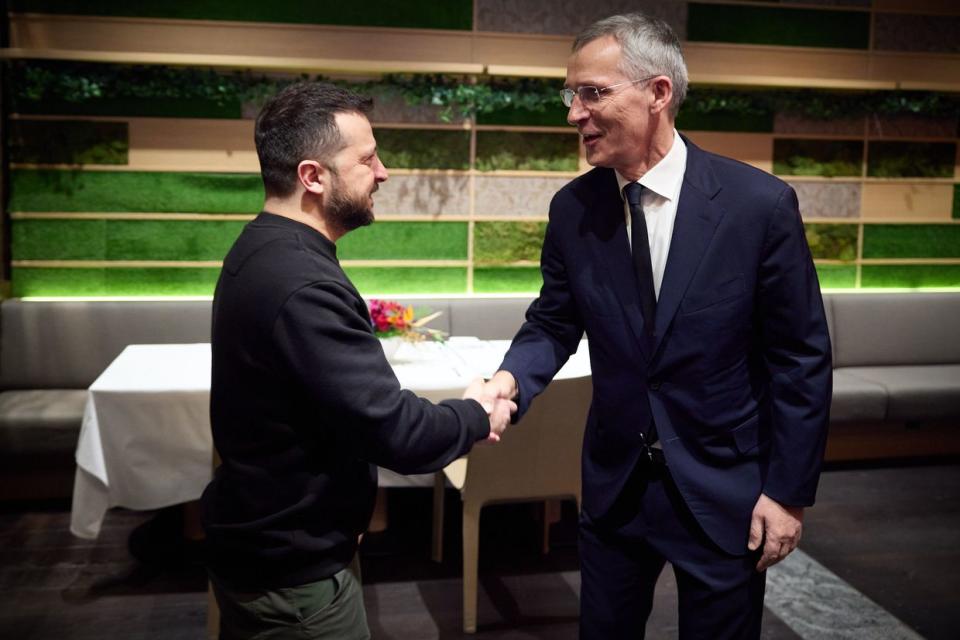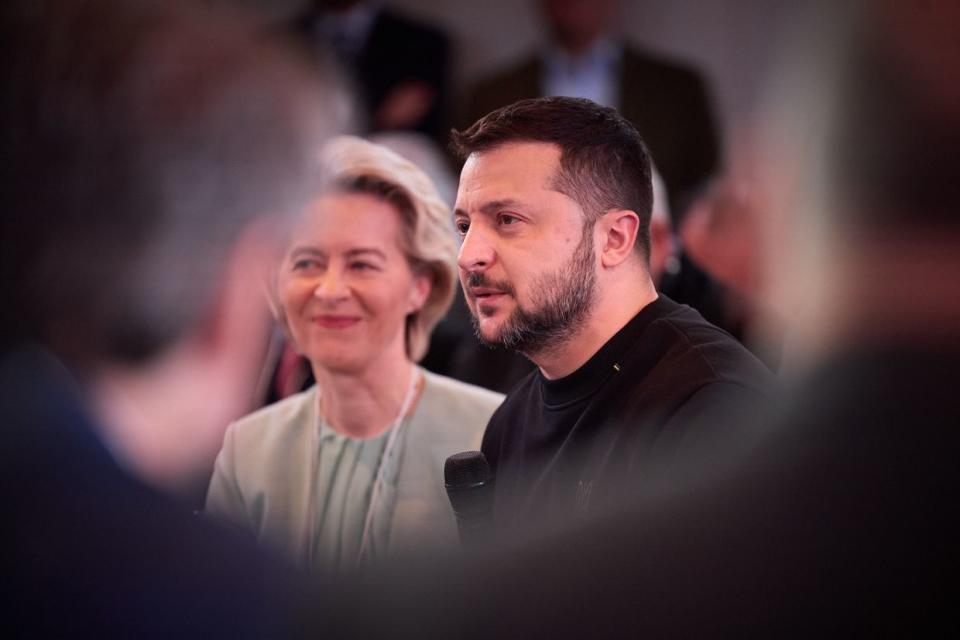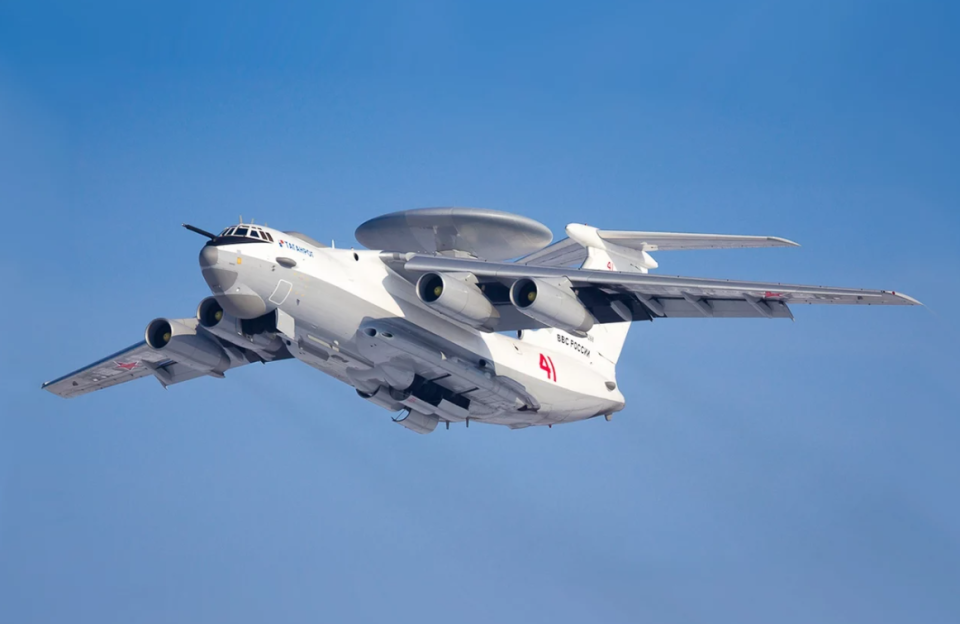Ukraine war latest: Zelensky attends Davos forum, meets NATO, EU chiefs
- Oops!Something went wrong.Please try again later.
- Oops!Something went wrong.Please try again later.
Key developments on Jan. 16:
Zelensky attends Davos forum, meets NATO, EU Commission chiefs
Ukraine's parliament votes for law to create electronic conscription registry
Ukraine amends conscription rules for military industry workers
Air Force: Downed A-50 spy plane 'serious blow' to Russia's aviation
Russia's Voronezh declares state of emergency after alleged drone attack
President Volodymyr Zelensky asked the world's business and political leaders at the World Economic Forum in Davos on Jan. 16 for resolve in supporting Ukraine, stressing that this is the only quick way toward just and stable peace.
As international support for Kyiv softens, Zelensky arrived in Switzerland to reinvigorate confidence among allies and partners.
“I appreciate your willingness to hear answers to really important questions. When will the war end? Is the Third World War possible? Is it time to negotiate with (Vladimir) Putin?” Zelensky opened his address to the forum.
Ukraine's head of state stressed that previous worries about escalation into a larger-scale war, which delayed resolute actions against Russia or vital military supplies for Ukraine, have proven void.
“Time was lost because of calls not to provoke escalation. Many of our most experienced warriors who have been fighting since 2014 have lost their lives,” the president said.
“Every 'don't escalate' addressed to us sounded like 'you will win' to Putin. We asked for new types of weapons, and in response, we heard: 'don't escalate.' But then the weapons arrived, and there was no escalation.”
Zelensky emphasized that Russia's aggression poses a threat not only to Ukraine but to the wider world, as evidenced by Moscow's actions in Syria and Africa. He also noted that all efforts to negotiate peace with Putin have failed, as the Kremlin's leader himself seeks war.
“In any violent confrontation, there is always a moment when the catastrophe can be stopped. Ukraine is such an opportunity,” Zelensky said in his speech.
“And all of us in the free world must be steadfast in our aspirations, actions, and goals just as Putin is forthright in his doomed ambitions.”
Zelensky's speech comes at a critical time, as over $100 billion in EU and U.S. funds remain stalled by political infighting.
At the sidelines of the forum, Zelensky met a number of senior political leaders, including European Commission President Ursula von der Leyen, NATO Secretary General Jens Stoltenberg, and U.S. Secretary of State Antony Blinken to discuss future support.

Washington, Ukraine's leading military donor, warned that it had delivered its final military aid package to Kyiv unless Congress approves additional funding. The aid bill has yet to pass either chamber of the U.S. legislature as political disputes between the Republican and Democratic parties persist.
Talks with von der Leyen also came at an important moment.
Zelensky said that the two leaders agreed to start screening Ukrainian legislation in preparation for the accession process, as the EU recently greenlighted admission negotiations with Kyiv.

One unresolved issue remains the 50-billion-euro funding package for Ukraine, which is currently stalled by Hungary. The bloc's leaders are expected to reconvene on the matter on Feb. 1.
During his address, the president further said that now is the time to invest in just and stable peace.
“Every reduction in pressure on the aggressor adds years to the war. But every investment in the defender's confidence shortens the war.”
Davos business meet up
The president's visit to Davos was also an opportunity to meet face-to-face CEOs of the world's business and financial giants.
Prior to his address, Zelensky attended meetings with international business leaders, seeking to increase investment in Ukraine's reconstruction and industry.
“We need you in Ukraine to build, to reconstruct, to restore our lives,” Zelensky told investors.
“Each of you can be even more successful with Ukraine.”
Kyiv sorely needs a financial boost as its infrastructure and economy continue to suffer under Russian aggression while Western funding simmers down.
The World Bank estimated that the total recovery cost for the coming years may amount to over $400 billion. One proposed way to collect these funds without burdening Ukraine's or its allies' budgets is confiscating Russian assets frozen on Western accounts.
Speaking at the forum, Zelensky called for a “strong decision” this year, which would allow Russian state and oligarchic assets to fund Ukraine's defense and reconstruction.
“Putin loves money above all else. The more billions he, his oligarchs, friends, and accomplices lose, the more he will regret starting this war.”
The U.S., with the support of the U.K., Japan, and Canada, are reportedly preparing viable options for confiscating Russian assets, which should be discussed during a G7 meeting in February.
Germany, France, Italy, and the EU expressed some reservations, fearing potential legal pitfalls, the Financial Times wrote.
U.S. Special Representative for Economic Recovery in Ukraine Penny Pritzker said during the forum on Jan. 15 that any decision on confiscation must be collective action and is unlikely to be taken quickly.
In his closing words in the address, Zelensky asked the forum's attendees to take part in building a just peace in Ukraine and invited them to the upcoming Global Peace Summit, which Switzerland agreed to host.
A day prior to the World Economic Forum, Davos hosted an advisory meeting on Ukraine's peace formula, a fourth such gathering in preparation for the summit.
“Today, our teams have already started work on organizing such a summit. Not the Third World War, but the Global Peace Summit.”
Read also: Talking business in Ukraine: Conversation with Monobank, country’s largest online bank
Mobilization in Ukraine
Ukraine's parliament passed a law creating an electronic conscription registry, lawmaker Yaroslav Zhelezniak said on Jan. 16.
As the military seeks to replenish its ranks amid the full-scale war with Russia, the government submitted a draft law on mobilization and military service to parliament on Dec. 25, outlining plans for further conscription and tightening restrictions on draft evaders.
The seperate bill passed on Jan. 16 does not address the larger issue of mobilization but aims to improve the digitalization of Ukraine's army.
The new legislation will create a single digital registry for conscription purposes that will have all the relevant information easily accessible to those overseeing mobilization.
It will make conscripts' contacts available for military recruiters, make it easier to identify who has already taken part in combat and streamline other processes related to mobilization and services for soldiers.
The bill “is critically important for the defense capability of Ukraine,” the Defense Ministry said.
Beyond addressing issues with digitalizing the personal information of soldiers and conscripts, the ministry said that the bill would strengthen cybersecurity and allow for the placement of its IT systems within the cloud storage of NATO member countries.
Shortly after being appointed in September 2023, Defense Minister Rustem Umerov announced his intention to digitize the conscription process and create an electronic military ID card.
“The task is to digitalize all processes and launch a single registry of conscripts, which will eliminate any corruption risks. Everything that can be digitalized must be digitalized,” said Umerov in September.
Meanwhile, the Ukrainian government changed the rules regarding the conscription of workers from the military industry, allowing companies producing military equipment to staff without restriction, the Economy Ministry said on Jan. 16.
Discussions on mobilization have been ongoing since Dec. 19, when President Volodymyr Zelensky said that Ukraine's military leadership had proposed to mobilize up to 500,000 additional conscripts.
Commander-in-Chief Valerii Zaluzhnyi then denied that figure but said that the military did have a plan for mobilization numbers for 2024.
Air Force: Downed A-50 spy plane 'serious blow' to Russia's aviation
Russia's loss of a Beriev A-50 spy aircraft recently downed by Ukraine won't dramatically affect the distribution of forces in the Ukrainian sky but will likely force Russia's aviation “to behave more cautiously,” Air Force spokesman Yurii Ihnat told Ukrainska Pravda on Jan. 16.
A day before, Commander-in-Chief Valerii Zaluzhnyi confirmed that the Ukrainian Air Force had destroyed a Russian A-50 military observation plane and an Ilyushin Il-22 plane that operates as an airborne command post.
According to the Air Force, the Il-22 managed to land in Russia after it was hit but can't be repaired.
Russia's A-50 aircraft provides several critical functions for the ongoing war in Ukraine, such as detecting air defense systems, guided missiles, and coordinating targets for Russian fighter jets. Russia only possesses nine of these planes.
It is unclear how the planes were brought down, but Ukraine received several pieces of advanced air defense systems in 2023, including Patriots from the U.S., which some analysts have alleged could have been responsible.
“The Air Force can now deliver such effective strikes, so the aggressor will probably behave more cautiously. Of course, this is a serious blow to Russian aviation, and most importantly, to the image of the Russian regime,” Ihnat said in a comment for Ukrainska Pravda media outlet.

“The loss of such a plane as the A-50 probably happened for the first time in history. At the same time, Russia still has several long-range radar detection aircraft in working order, and the dictator is not going to stop.”
Ukraine has destroyed at least seven Russian planes since the beginning of December, a landmark military achievement for the country and a significant blow to Russia.
The sharp uptick in downing planes in recent weeks emerges as a bright spot for Ukraine amid a lack of progress on the battlefield.
The A-50 alone reportedly costs $330 million, and although estimates vary, Western sources say that Russia has fewer than 10 in its fleet. Belarusian partisans attacked another A-50 aircraft at an airbase near Minsk in February 2023, causing an unknown amount of damage.
Read also: Ukraine’s air defense notches a string of successes against Russian air power
Russia's Voronezh declares state of emergency after alleged drone attack
A state of emergency was announced in Voronezh following an overnight drone attack on the Russian city, Voronezh Mayor Vadim Kstenin said on Jan. 16.
Explosions were reported in Voronezh, which lies around 200 kilometers from the Ukrainian border, in the early hours of the morning.
The Russian Defense Ministry claimed that eight drones were shot down over Voronezh Oblast and blamed Ukraine for the attack. Kyiv has not claimed responsibility.
Kstenin announced a state of emergency at 4:30 a.m. local time and said it had been introduced for "speedy decision-making."
According to Kstenin, at least 30 windows were damaged in the alleged attack, and a school was partially converted into a "temporary accommodation point" for those affected.
He claimed that the state of emergency "will also allow for prompt implementation of measures to replace them," and residents will be compensated for damage.
Voronezh Oblast Governor Alexander Gusev said that a child was injured "as a result of fragments of a downed UAV entering an apartment," and received medical attention at the site.
Gusev claimed that, as of 9:15 a.m., no one had asked to use the temporary shelter set up in the school, as "residents stayed with relatives."
The Kyiv Independent could not independently verify any of these claims.
Read also: Ukrainians pay tribute to fallen soldier and poet Maksym Kryvtsov (PHOTOS)
We’ve been working hard to bring you independent, locally-sourced news from Ukraine. Consider supporting the Kyiv Independent.

